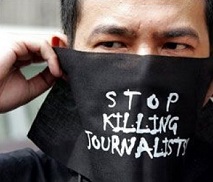 The United Nations General Assembly adopted Resolution (A/RES/68/163) of December 18, 2013 on The Safety of Journalists and the Issue of Impunity. This landmark Resolution − the first of the General Assembly on the issue “condemns unequivocally all attacks and violence against journalists and media workers, such as torture, extra judicial killings, enforced disappearances and arbitrary detention, as well as intimidation and harassment in both conflict and non-conflict situation.” The Resolution also proclaimed November 2 as the International Day to End Impunity for Crimes against Journalists.
The United Nations General Assembly adopted Resolution (A/RES/68/163) of December 18, 2013 on The Safety of Journalists and the Issue of Impunity. This landmark Resolution − the first of the General Assembly on the issue “condemns unequivocally all attacks and violence against journalists and media workers, such as torture, extra judicial killings, enforced disappearances and arbitrary detention, as well as intimidation and harassment in both conflict and non-conflict situation.” The Resolution also proclaimed November 2 as the International Day to End Impunity for Crimes against Journalists.
The date of November 2 was chosen in commemoration of the assassination of two French journalists killed in Mali on November 2, 2013. However it must be noted, in statistics drawn up by UNESCO, 94 percent of the media people killed are local, 6 percent are foreign correspondents.
The focus on impunity stems from the fact that in the last decade more than 700 journalists and media workers have been killed and that hardly any perpetrators of these crimes have been arrested or brought to trial. One reason for the few arrests may be that the killers have links to governments and their security forces. The concept of impunity is defined as the failure to bring perpetrators of human rights violations to justice and as such constitutes a denial of the victims’ rights to justice and redress.
Despite the recent and widely-discussed ISIS beheadings of two journalists, killing is not the only danger that media workers face. There are many forms of intimidation and harassment and methods of keeping information out of sight. However, the internet and the development of inexpensive recording equipment have led to a growth in the number of “citizen journalists.” Governments are particularly fearful of the power of Internet use, especially when linked to demonstrations as we saw in Egypt, Ukraine, and currently Hong Kong. There has been repression against some citizen journalists and increasingly sophisticated forms of censorship.
Of course, not all the information which circulates on the internet is accurate and much makes no pretense of being objective. Nevertheless, information does flow. As for the role of non-governmental organizations (NGOs), they should weigh this information and check the data, then see how best to follow up. There is a need for cooperation among local, national and international NGOs to be able to see how best to advance conflict resolution and justice in regards to journalists’ rights and safety.(1) The International Day to Protect Journalists can be a day of taking stock of our efforts and reflecting on the dangers and opportunities that are open to us.
Note
1) See the efforts of the US-based Committee to Protect Journalists; the Canadian-based transnational network of NGOs working to promote freedom of expression as a fundamental human right: IFEX. For the growing role of citizen journalists on the Internet, what it calls Netizens, see Global Voices Online.
Rene Wadlow is the Representative to the United Nations, Geneva of the Association of World Citizens.
